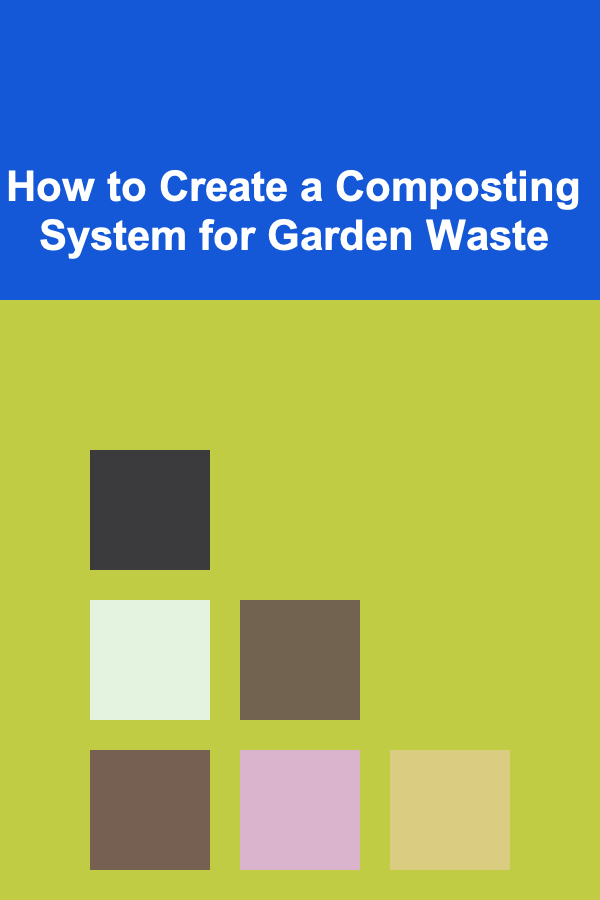
How to Create a Composting System for Garden Waste
ebook include PDF & Audio bundle (Micro Guide)
$12.99$7.99
Limited Time Offer! Order within the next:

Composting is an eco-friendly method of recycling organic waste into valuable fertilizer for your garden. Creating a composting system for garden waste not only reduces landfill contributions but also enriches soil, improves plant health, and promotes sustainable gardening practices. This comprehensive guide will walk you through the process of setting up a successful composting system, from understanding the basics to maintaining it effectively.
Understanding Composting
1.1 What is Composting?
Composting is the natural process of decomposing organic matter, such as leaves, grass clippings, vegetable scraps, and other garden waste, into a nutrient-rich soil amendment known as compost. This process occurs through the action of microorganisms, fungi, and other decomposers that break down organic materials.
1.2 Benefits of Composting
The benefits of composting extend beyond simply reducing waste. Some key advantages include:
- Soil Enrichment: Compost adds essential nutrients to the soil, improving plant health.
- Water Retention: It enhances soil structure and moisture retention, reducing watering frequency.
- Erosion Prevention: Compost helps prevent soil erosion by binding soil particles together.
- Waste Reduction: Composting diverts organic waste from landfills, reducing methane emissions.
- Eco-Friendly Fertilizer: It provides a chemical-free alternative to synthetic fertilizers.
By creating a composting system, you contribute to sustainability while enhancing your garden's productivity.
Types of Composting Systems
2.1 In-Ground Composting
In-ground composting involves digging a hole in your garden where organic waste is layered and allowed to decompose naturally. This method is low-maintenance and blends seamlessly with the garden ecosystem.
2.2 Bin Composting
Bin composting uses a designated container (often made of wood, plastic, or wire) to hold the compost materials. Bins can be purchased or constructed at home, providing a neat and contained space for composting.
2.3 Tumbler Composting
Tumbler composters are cylindrical containers that rotate on a central axis. This design facilitates aeration and mixing, resulting in faster decomposition. They're ideal for smaller spaces and can be more efficient than traditional bins.
2.4 Vermicomposting
Vermicomposting uses worms, typically red wigglers, to break down organic matter. This method produces high-quality compost called worm castings, which are rich in nutrients. Vermicomposting is great for those with limited outdoor space.
Setting Up Your Composting System
3.1 Choosing a Location
Selecting the right location for your composting system is crucial:
- Accessibility: Choose a spot that's easy to access for adding materials and turning the pile.
- Sunlight: A sunny location helps speed up decomposition by warming the materials.
- Drainage: Ensure good drainage to prevent waterlogging, which can hinder aerobic decomposition.
Aim for a balance between sunlight and shade to maintain optimal moisture levels.
3.2 Selecting the Right Container or Bin
Consider the following factors when choosing a container:
- Size: Determine how much compost you'll produce based on your garden size and waste output.
- Material: Wooden bins are breathable and aesthetically pleasing; plastic bins are durable and often easier to clean.
- Ventilation: Ensure your bin has adequate airflow for effective decomposition.
Select a container that meets your needs and complements your garden's design.
3.3 Creating the Compost Layers
Layering is vital for a balanced compost pile. Follow these steps:
- Base Layer: Start with coarse materials like twigs or straw to promote aeration.
- Green Materials: Add nitrogen-rich materials, such as vegetable scraps and grass clippings.
- Brown Materials: Incorporate carbon-rich items like dry leaves and paper.
- Repeat Layers: Continue alternating layers until the bin is full or reaches a desirable height.
Aim for a ratio of roughly 2:1 brown to green materials to create an optimal environment for decomposition.
What to Compost
4.1 Green Materials
Green materials are rich in nitrogen and include:
- Vegetable scraps
- Grass clippings
- Coffee grounds
- Fruit peels
- Fresh plant trimmings
These materials help to accelerate the composting process due to their higher moisture content.
4.2 Brown Materials
Brown materials provide carbon, which is essential for microbes:
- Dried leaves
- Straw or hay
- Cardboard and paper
- Wood chips
- Pine needles
A healthy compost pile needs both green and brown materials to achieve proper balance.
4.3 What Not to Compost
Some items should never be included in your compost pile:
- Meat and dairy products (attract pests)
- Oily or fatty foods (can create odors)
- Diseased plants (risk of spreading diseases)
- Weeds that have gone to seed (may propagate unwanted plants)
- Chemically treated materials (pesticides and herbicides)
Avoiding these materials ensures a successful and odor-free composting process.
Maintaining Your Compost Pile
5.1 Moisture Control
Maintaining appropriate moisture levels is crucial for effective composting:
- Ideal Moisture Content: The pile should be as damp as a wrung-out sponge. If too dry, add water; if too wet, mix in more brown materials.
- Covering: Use a tarp or lid to protect the pile from excessive rain and drying out.
Regularly check moisture levels to keep the decomposition process on track.
5.2 Aeration
Aerating the compost pile allows oxygen to reach the microorganisms responsible for decomposition:
- Turning the Pile: Use a pitchfork or shovel to turn the compost every few weeks, introducing fresh air and promoting even decomposition.
- Use of Aeration Tools: Consider using compost aerators for deeper mixing and improved airflow.
Adequate aeration speeds up the composting process and minimizes odors.
5.3 Monitoring Temperature
Temperature plays a significant role in composting efficiency:
- Hot Composting: Ideal temperatures range from 130°F to 160°F (54°C to 71°C). At this point, beneficial microorganisms thrive, and pathogens are destroyed.
- Cold Composting: Slower decomposition occurs at lower temperatures, producing compost over a longer period.
Monitor temperature with a compost thermometer to ensure optimal conditions.
Using Finished Compost
6.1 How to Tell When Compost is Ready
Finished compost has distinctive characteristics:
- Appearance: Dark, crumbly texture resembling rich soil.
- Smell: Earthy aroma without any unpleasant odors.
- Decomposed Materials: Original materials should be unrecognizable.
Typically, compost takes anywhere from 2 to 6 months to mature, depending on conditions and the types of materials used.
6.2 Applying Compost to Your Garden
Once ready, compost can be applied in several ways:
- Soil Amendment: Mix compost into garden beds before planting to improve soil structure and nutrient content.
- Top Dressing: Spread a layer of compost on the surface of existing gardens to provide ongoing nutrients.
- Potting Mix: Incorporate compost into potting mixes for container gardening.
Using finished compost boosts soil fertility and supports healthy plant growth.
Common Problems in Composting
7.1 Odors
Unpleasant smells can arise from issues in the composting process:
- Causes: Typically due to excess moisture, lack of aeration, or inappropriate materials.
- Solutions: Increase aeration by turning the pile, reduce moisture, or add more browns.
Regular monitoring and adjustments can eliminate odors.
7.2 Pests
Attracting pests is a common concern for composters:
- Prevention: Keep the bin covered, avoid meat and dairy, and bury food scraps within the pile.
- Management: Introduce beneficial insects that prey on pests, and use traps to capture unwanted visitors.
Effective management keeps your composting system healthy and pest-free.
7.3 Slow Decomposition
If decomposition is slow, consider these strategies:
- Increase Aeration: Turn the pile frequently to promote better airflow.
- Adjust Material Ratios: Ensure the right balance of greens and browns.
- Add Water: Check moisture levels and adjust as necessary.
Identifying and addressing the root causes will speed up the composting process.
Conclusion
Creating a composting system for garden waste is an invaluable skill that benefits both your garden and the environment. By understanding the principles of composting, selecting the right system, and maintaining your compost pile effectively, you can transform organic waste into nutrient-rich compost.
Embrace the journey of composting. As you witness the transformation of kitchen scraps and garden debris into rich soil, you'll foster a more sustainable lifestyle and enhance your gardening efforts. Happy composting!

How to Care for Your Pet During Different Life Stages
Read More
How to Choose the Right Pendant Lighting for Your Kitchen Island
Read More
How to Create a Checklist for Managing Event Transportation and Parking
Read More
How To Master Robot Path Planning
Read More
How To Design Stunning Visual Aids: Captivating Your Audience and Enhancing Understanding
Read More
10 Tips for a DIY Deck Building Checklist: Safety First!
Read MoreOther Products

How to Care for Your Pet During Different Life Stages
Read More
How to Choose the Right Pendant Lighting for Your Kitchen Island
Read More
How to Create a Checklist for Managing Event Transportation and Parking
Read More
How To Master Robot Path Planning
Read More
How To Design Stunning Visual Aids: Captivating Your Audience and Enhancing Understanding
Read More